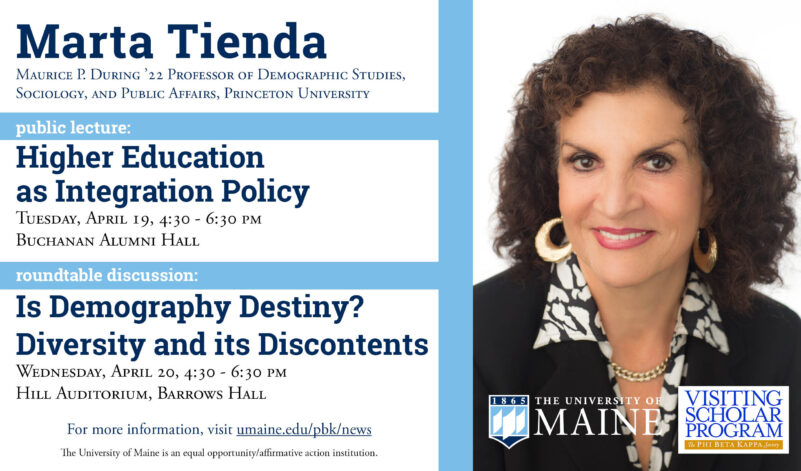
Phi Beta Kappa Visiting Scholar Program Welcomes Sociologist Marta Tienda
The Delta Maine Chapter of the Phi Beta Kappa Honor Society at the University of Maine will welcome renowned sociologist Marta Tienda (Princeton University) on April 19 and 20 as its 2022 Phi Beta Kappa Visiting Scholar. As part of her visit, Tienda will visit with students across campus, deliver a public lecture, and take part in a roundtable discussion with University of Maine faculty members.
On Tuesday, April 19 at 4:30 pm in Buchanan Alumni Hall, Tienda will deliver a public lecture titled “Higher Education as Integration Policy.” Tienda’s talk will argue that restoring the nation’s unconditional commitment to quality public education is essential not only to revive economic mobility and restore broadly shared prosperity, but also to broaden the national project of integration beyond race and national origins. Using her personal biography as prologue, Tienda will provide a 50-year retrospective that illustrates how the national project of integration eroded as the population became more diverse and social mobility stagnated against a backdrop of rising economic inequality.
On Wednesday, April 20 at 4:30 in Hill Auditorium, Barrows Hall, Tienda will be joined by UMaine faculty members Nicholas Micinski, Lisa Neuman, Brian Pitman, and Amy Fried for a roundtable discussion titled “Is Demography Destiny? Diversity and its Discontents.” The conversation will address the changing ethno-racial composition of the U.S. population and discuss whether and how diversity undermines cohesion on college campuses.
Marta Tienda is Maurice P. During ’22 Professor in Demographic Studies, Professor of Sociology and Public Affairs, with joint affiliations in the Office of Population Research and the Princeton School of Public and International Affairs. From 1997 to 2002, she served as director of the Office of Population Research. Tienda is co-author and co-editor of several books, including Divided Opportunities (1988), The Color of Opportunity (2001), Youth in Cities (2002). Ethnicity and Causal Mechanisms (2005), Multiple Origins, Uncertain Destinies (2006), Hispanics and the Future of America (2006), and Africa on the Move (2006). She has published over 200 scholarly papers in academic journals and edited collections, in addition to numerous research bulletins and articles for a lay audience. She holds a BA in Spanish from Michigan State University and a MA and Ph.D., both in Sociology, from the University of Texas at Austin. She received honorary doctorates from The Ohio State University (2002), Lehman College (2003), and Bank Street College (2006).
Professor Tienda’s research interrogates how ascribed attributes acquire their social and economic significance by investigating racial, ethnic and gender variations in social inequality. She is co-author of The Hispanic Population of the United States (1987), the first national comparison of the major nationality groups. She also has written extensively about equity and access to higher education and lectured about consequences of underinvestment in public education. Professor Tienda held appointments at the University of Chicago, where she served as chair of the Department of Sociology and editor of the American Journal of Sociology, and the University of Wisconsin at Madison. She is past president of the Population Association of America, a member of the American Academy of Arts and Sciences, the American Academy of Political and Social Sciences, and the American Academy of Education. She also serves on several philanthropic organizations.
Since 1956, the Phi Beta Kappa Visiting Scholar Program has been offering undergraduates the opportunity to spend time with some of America’s most distinguished scholars. The purpose of the program is to contribute to the intellectual life of the campus by making possible an exchange of ideas between the Visiting Scholars and the resident faculty and students.
Phi Beta Kappa is America’s oldest Greek-letter organization and national academic honor society. The Delta of Maine chapter of Phi Beta Kappa received its charter at the University of Maine in Orono in 1922. The purpose of the honorary society is to recognize and encourage scholarship, friendship, and cultural interests.
